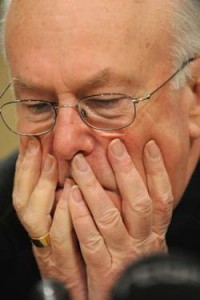The 2015 Synod approaches: tomorrow (Friday), Cardinal Baldisseri holds a press briefing to announce the new rules governing the event. Then the opening Mass Sunday, and on Monday the discussions begin. I keep trying to reassure friends, and myself, that everything is going to work out. For one thing, the defenders of the Church’s constant practice and discipline regarding divorce and remarriage are much better prepared. Much good has come out of that 2014 Synod, just in terms of the books and articles published by key cardinals, bishops and theologians. In addition, the motu proprio on annulments issued by Pope Francis has probably taken some of the steam out of those looking for even more radical measures.
But leaving aside the substance of the motu proprio, the very fact that it was issued just prior to the Synod seems to raise questions about the supposed openness of what’s about to happen. A great deal has already been said or written about the content of the document, but surprisingly very little has been said about the timing of its release.
It was very strange that the comments of last year’s interim report dealing with the issue of communion for the divorced and remarried and the positive aspects of homosexual unions was inserted into the final document, even though they had not received the required two-thirds vote of the bishops. This was evidently done at the instruction of Pope Francis himself, and it raises the question of why his insistence that they be included. I’m not sure, and it should probably not be taken for certain that it was because he supports changes on both fronts.
More interesting for me, is that numbers 114 and 115 of the 2015 Instrumentum laboris (Working Plan) dealt with possible changes in the annulment process to make it more streamlined. Number 114 indicated that a large number of bishops supported such suggestions, but that another group of bishops opposed them. The new motu proprio virtually lifted the changes from these two sections and made them Church law prior to any discussion at the Synod. Heads of various Vatican Dicasteries have made it clear that they were not consulted either, which is itself a break in protocol – to say the least.

Much has been written about the unique character of this Synod under Francis, stressing its openness and transparency compared with previous synods. But the issuing of a motu proprio prior to any discussion seems to conflict with such an assessment. Surely, the matters put into the working document were meant for discussion at the Synod. Why short circuit this process by issuing the pope’s final determination prior? That seems to stand the whole process on its head. What this suggests, when Dicasteries and the Synod are bypassed, is anything but an open process. It suggests some agenda. Will any of the bishops bring this up at the Synod, since Francis has called for Parrhesia (frankness) to be its governing principle.
There is a second issue hovering over this Synod, which no one is really talking about either because of all the concentration on matters of substance: the appointment of Cardinal Godfried Danneels to the Synod by Pope Francis. Normally, this would be of little interest, but an authorized biography has just been published in which this Belgian cardinal boasts that he was part of a group of European bishops who were opposed to the pontificate of Benedict XVI, very much desired the election of Francis, and worked for it. There is something unsavory in all this, but one might write it off as just Church politics.
There is a more serious cloud hanging over him, however, his admitted role in covering up the sexual abuse of a minor just after he had retired from office. He had to admit it, because his whole – rather disgusting – intervention was secretly taped by the victim when he met with the cardinal and the bishop who abused him for many years (his own uncle, who was also a friend of Cardinal Danneels). The bishop had requested this meeting hoping that the cardinal could convince his nephew to drop his ultimatum that he immediately retire from office, or the whole sordid mess would be made public. He didn’t trust his uncle or the cardinal, and so taped the whole conversation.
Evidently Cardinal Danneels tried to convince the victim – now in his forties – to just let the long-passed abuse go, and allow his uncle, who was up for retirement within a year, to do so without disgrace. He even suggested to the young man that he too would be better off if he did so, which any ordinary person might well take as a veiled threat. The victim was not intimidated and decided to go public, which caused a great stir in Belgium and elsewhere in Europe. The cardinal is now in disgrace in the eyes of many.
How can Pope Francis pay such an honor to a cardinal who tried to cover up an extreme case of child abuse by giving him a special appointment to the Synod? According to the operational norms of the new commission he has set up, any active bishop would have to resign his office for even one instance of such an admitted cover-up. The groups of victims of child abuse may not take it well that the cardinal, a friend of the pope, is given such an honor, especially at a Synod on the family. And the blowback could come right in the middle of much other controversy and confusion at the Synod itself.














